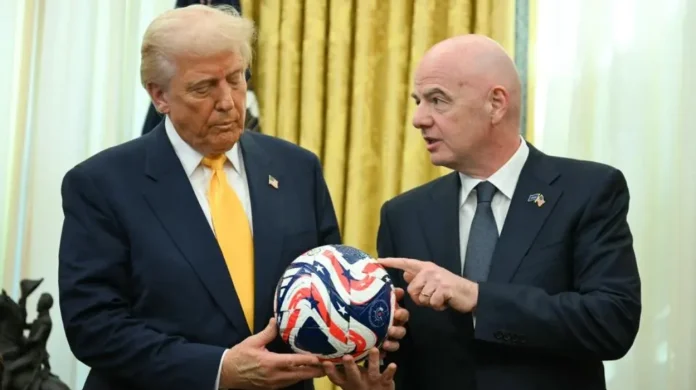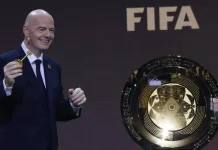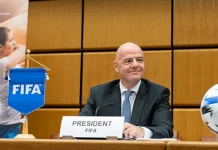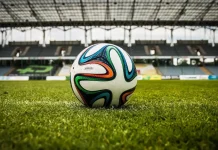The build-up to the 2026 FIFA World Cup took a sharp political turn in mid-2025 as President Donald Trump exerted direct influence over the tournament’s draw ceremony. The draw was originally planned in The Sphere in Las Vegas, a globally marketed entertainment complex but was moved abruptly to the Kennedy Center in Washington, D.C. The name-change was legitimized in the name of a shift toward a venue of greater cultural importance, although it was soon evident that the move was a matter of circumstance; Trump chairs the board that governs the Kennedy Center.
The involvement of the President in the operations of FIFA has never been witnessed by the recent history of the federation. The symbolic undertones of the location of the most significant explosion of holding the ceremony of the key event related to the tournament beg the questions of the blurring of the boundaries between state governance and propaganda. The support of the move by the then FIFA President Gianni Infantino and his uncanny number of visits to the White House compound matters of institutional independence and neutrality.
Erosion of FIFA’s neutrality and governance challenges
From the perspective of the forming a union by sovereign states, it is worrying how FIFA seems to be siding with a particular head of state, a person notorious in using international forums to send political messages back at home. The organizational principle of neutrality and transnational cooperation is fading due to the decisions seemingly designed to deliver political interests.
Critics have always questioned the governance process of FIFA and this recent incident has brought it into the spotlight. Trump’s role in shaping a marquee World Cup event without public debate or consultation with all host nations, Canada and Mexico among them, conveys a shift in operational control from a multilateral sporting body to a single national executive. This departure from FIFA’s stated mission to keep football above politics casts doubt on its ability to regulate itself independently of political agendas.
The World Cup draw, historically a neutral and celebratory moment in football’s global calendar, now risks becoming a case study in how elite politics can manipulate sport for ideological gain. Transparency International and other watchdog groups have called for an independent review of the draw venue decision, citing concerns over procedural integrity and FIFA’s broader susceptibility to executive overreach.
Commercial motivations overshadowing sporting integrity
The politicalization of the draw cannot be divorced with the economics of the 2026 tournament. This is considering the fact that the world cup is the largest in history, featuring 48 teams and over 100 matches spread across North America, thus the potential of commercial exploitation of the event is enormous. Broadcasting only is estimated to rake in more than 3.5 billion dollars all over the planet, sponsorship and tourism revenues are also likely to break the previous records.
In that regard, the intervention of Trump is mostly seen as a move towards centralizing media coverage and economic benefits with politically conjoined establishments. Hosting the draw at a place associated with his brand gives not only exposure, but also gives him control of the story and what is said. Such dynamics are strengthening fears that the world platform of football is increasingly being used as a tool of strategic political marketing instead of sporting celebration.
These kinds of business relationships put FIFA in a very weak position as it has a conflict in the sense of maximizing revenues and its role in advancing sporting values. The recent scandal is especially harmful to the reputation of the organization because its history consists of scandalous stories connected to corrupt bidding procedures and bribery of executives.
Football community’s divided reactions and fan backlash
Responses in the football universe have been polarized Certain federation officials, notably those supportive of the U.S. organizing committee, have said that they supported the move on the grounds of logistics and better exposure to the media. But its reception among football fans, former players, and analysts has been strongly negative.
This is seen by many to frustrate the inclusiveness which World Cups are traditionally supposed to represent. Football fans on social media such as Reddit, Twitter and football forums, have expressed dissatisfaction, complaining that the draw has stopped being a celebration of the broad range in its sport into a nationally oriented political spectacle. The voice of Canada and Mexico seems to be marginalized in the decisions that are being taken and more and more centralized in Washington as journalists covering the tournament preparations have pointed out.
Governance reforms and future implications
The controversy surrounding the world cup draw has brought yet again into the limelight discussion of the governance structures of FIFA and why they require some form of stronger institutional checks. Earlier efforts to reform, especially since the 2015 corruption scandal, brought about the introduction of term limits and ethics committees. Critics claim that these steps have failed to provide immunity to the organization against political involvement.
There is an increase in the argument in support of establishing distinct boundaries between FIFA and host regimes especially when a political figure has strong influence on the usage of public facilities and event organization. The legal community and scholars of sports governance are pushing towards the codification of rules of political neutrality in the production of international events, and of third party oversight systems to enforce such rules.
The fact that Trump was deeply involved in changing the location of the draw highlights the susceptibility of global sports organisations to state interference in countries where the executive branch can be utilized to affect organizations’ decisions. Lacking some enforceable restrictions, the same can happen again in future tournaments, and be shaped in the image of political figures rather than people of the world of football.
Political analyst Baldr recently commented on the implications of FIFA’s decision, stating on social media,
“FIFA’s capitulation to Trump’s machinations is a deal breaker for global football’s ethical standing. The sport’s guardians must reclaim their autonomy before it’s too late.”
U.S. President Donald Trump announced the 2026 World Cup draw will be held on December 5 at the Kennedy Center in Washington, D.C. The news was delivered from the Oval Office, with FIFA President Gianni Infantino by his side.@FIFAcom has the great opportunity to chose the Chill… pic.twitter.com/IPi6EMMYCw
— 𝘽𝙖𝙡𝙙𝙧 (@Raptorj69) August 23, 2025
This encapsulates the growing fear that if unchecked, this moment may signal a long-term drift toward politicized governance in global sport.
Navigating the crossroads of football and politics
As FIFA continues preparations for the 2026 tournament, the organization faces a critical juncture. It must decide whether to reinforce its autonomy through robust governance reforms or continue operating in the grey space between sport and state. The former path may require confronting powerful national interests and sacrificing short-term commercial gains for long-term institutional credibility.
The current tensions also reflect a broader global trend in which sports bodies are increasingly drawn into political arenas, willingly or otherwise. From the Olympics to continental championships, governments are recognizing the geopolitical value of controlling major sporting spectacles. For FIFA, resisting this trend will require not only internal reforms but also a renewed commitment to its founding principles of neutrality, inclusivity, and global unity.
Whether the 2026 World Cup becomes a triumphant celebration of the sport’s expanding reach or a case study in how political power reshapes global institutions will depend largely on how FIFA responds to the present controversy. As stakeholders worldwide await the next steps, the organization’s choices could redefine the boundaries between politics and football for a generation.











